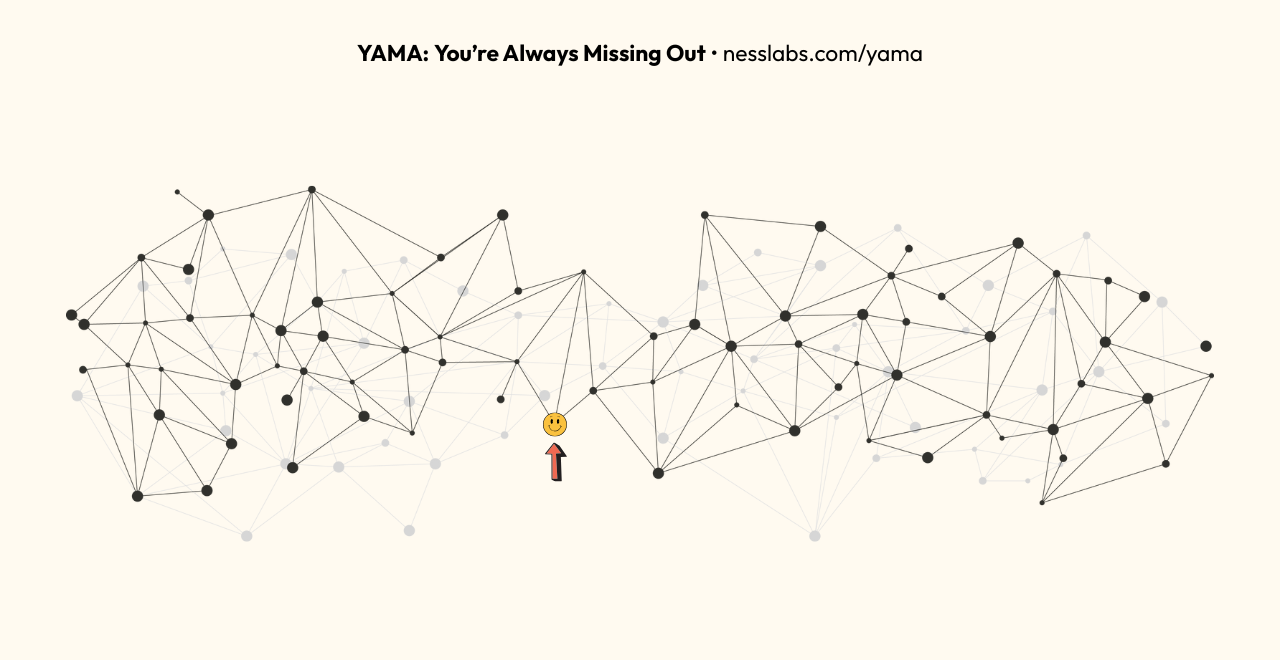Our ancestors faced relatively few choices in their daily lives, especially when it comes to entertainment options. Today, we have access to an endless buffet of content and social events.
Each year, over 50,000 concerts take place in the United States. More than 140 artists performed at Coachella alone. Netflix offers more than 5,000 films and 2,500 series. Meanwhile, U.S. publishers release approximately 275,000 new titles annually.
This explosion of choice has created a new form of psychological overwhelm that our brains weren’t designed to handle.
So when I saw a tweet from someone at Vibecamp about a new term—YAMA, or “You’re Always Missing Out”—something clicked. Here’s how they described it: “since you’re always already missing out on something, there’s no use in worrying about that which you may be missing. do as you like with no regrets!”

(and no I don’t know why the person who coined it didn’t go with YAMO)
When everything is an option
When faced with too many options, we experience what psychologists call “choice overload”, a phenomenon where having more choices actually decreases our satisfaction and increases anxiety. The prefrontal cortex, responsible for decision-making, becomes overtaxed when processing numerous alternatives, leading to heightened stress responses.
Some evolutionary psychologists believe that this heightened stress response might have been adaptive. In small hunter-gatherer communities, failing to participate in social activities could have serious consequences for survival and reproductive success.
But in today’s world, these same mechanisms are constantly triggered by an overwhelming array of experiences we could pursue, from Netflix’s thousands of titles to countless travel destinations, learning opportunities, and social events.
The result is time anxiety: the fear that we’re not making the most of our limited time. This creates a cycle where every choice feels urgent, yet no single choice can satisfy our sense that we should be doing more.
YAMA (You’re Always Missing Out) differs from JOMO (the Joy of Missing Out) in important ways. JOMO helps when you’re deciding whether to attend a specific event. But YAMA is more universal, applying whether you’re choosing between TV shows, deciding which artist to see at a festival, or browsing books to choose your next read.
(may I recommend Tiny Experiments?)
JOMO is based on active choice. YAMA can be about going with the flow: since you’re always missing something anyway, there’s no point in being anxious about it. YAMA may also be more sustainable because it doesn’t require manufacturing positive emotions. While JOMO asks you to find joy in missing out, YAMA simply asks you to accept that experiencing everything is impossible.
I think that’s what I like the most about this concept: YAMA recognizes that missing out is a fundamental part of the human condition. Rather than fighting this reality or trying to optimize around it, YAMA suggests simply accepting that we’re finite creatures in an infinite world.
How to practice YAMA in daily life
YAMA works across many situations, whether you’re choosing what to watch, which event to attend, or what to learn next. Here’s how to apply it:
1) Before the activity: Acknowledge that by choosing one option, you’re necessarily not choosing countless others, and that’s okay. Take a moment to remind yourself that in your current reality with our known laws of physics, you simply don’t have access to all possible experiences. This simple recognition takes the pressure off optimizing for the absolute best use of your time.
2) During the activity: When you notice your mind wandering to other possibilities or comparing your current experience to what you might be missing, gently redirect your attention to the current activity. The idea isn’t to force joy, but simply to stay present with your actual experience instead of worrying about alternative ones you’re missing.
3) After the activity: Resist the urge to evaluate whether you made the “right” choice or to immediately seek validation through social media or even planning the next activity. Instead, acknowledge that you had one specific experience out of many possible ones, and that this limitation is inherent to life as a human being.
Pay attention to how different ways of choosing actually make you feel. Experiment with various approaches: sometimes research your options thoroughly, other times pick randomly, and occasionally let friends choose or simply go with whatever’s right in front of you.
When done intentionally, these different approaches can teach you that how you choose often matters less than you think, and that releasing control can be surprisingly freeing.
What’s most liberating about YAMA is its honesty about the human condition. We have limited time, attention, and capacity for experience. No amount of productivity hacking or careful planning will change that.
By accepting our constraints rather than fighting them, we can choose from curiosity instead of anxiety, and perhaps discover that missing out isn’t the problem we thought it was.
